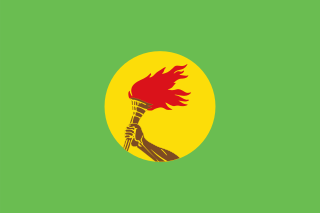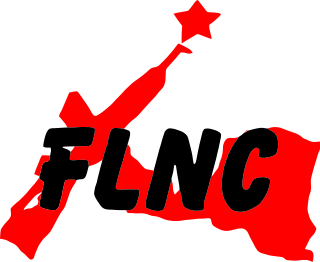The earliest known human settlements in what is now the Democratic Republic of the Congo have been dated back to the Middle Stone Age, approximately 90,000 years ago. The first real states, such as the Kongo, the Lunda, the Luba and Kuba, appeared south of the equatorial forest on the savannah from the 14th century onwards.

Politics of the Democratic Republic of Congo take place in a framework of a republic in transition from a civil war to a semi-presidential republic.
The Armed Forces of the Democratic Republic of the Congo is the state organisation responsible for defending the Democratic Republic of the Congo. The FARDC was rebuilt patchily as part of the peace process which followed the end of the Second Congo War in July 2003.

Zaire, officially the Republic of Zaire, was the name of the Democratic Republic of the Congo from 1971 to 1997. Located in Central Africa, it was, by area, the third-largest country in Africa after Sudan and Algeria, and the 11th-largest country in the world from 1965 to 1997. With a population of over 23 million, Zaire was the most populous Francophone country in Africa. Zaire played a central role during the Cold War.

Laurent-Désiré Kabila usually known as Laurent Kabila, was a Congolese rebel and politician who served as the third President of the Democratic Republic of the Congo from 1997 until his assassination in 2001.

Mobutu Sese Seko Kuku Ngbendu wa za Banga, commonly known as Mobutu Sese Seko or simply just Mobutu and also by his initials MSS, was a Congolese politician and military officer who was the 1st and only President of Zaire from 1971 to 1997. Previously, Mobutu served as the 2nd President of the Democratic Republic of the Congo from 1965 to 1971. He also served as the 5th Chairman of the Organisation of African Unity from 1967 to 1968. During the Congo Crisis, Mobutu, serving as Chief of Staff of the Army and supported by Belgium and the United States, deposed the democratically elected government of left-wing nationalist Patrice Lumumba in 1960. Mobutu installed a government that arranged for Lumumba's execution in 1961, and continued to lead the country's armed forces until he took power directly in a second coup in 1965.

The Democratic Republic of the Congo, also known as Congo-Kinshasa, Congo-Zaire, Congo DR, DR Congo, DRC, or simply either Congo or the Congo, is a country in Central Africa. By land area, the DRC is the second-largest country in Africa and the 11th-largest in the world. With a population of around 105 million, the Democratic Republic of the Congo is the most populous Francophone country in the world, and the fourth-largest in Africa. The national capital and largest city is Kinshasa, which is also the economic center. The country is bordered by the Republic of the Congo, Central African Republic, South Sudan, Uganda, Rwanda, Burundi, Tanzania, Zambia, Angola, the Cabinda exclave of Angola, and the South Atlantic Ocean.

Joseph Kabila Kabange is a Congolese politician who served as President of the Democratic Republic of the Congo between January 2001 and January 2019. He took office ten days after the assassination of his father, President Laurent-Désiré Kabila in the context of the Second Congo War. He was allowed to remain in power after the 2003 Pretoria Accord ended the war as the president of the country's new transitional government. He was elected as president in 2006 and re-elected in 2011 for a second term. Since stepping down after the 2018 election, Kabila, as a former president, serves as a senator for life.

Léon Kengo wa Dondo is a Congolese politician who served as the "first state commissioner" several times under Mobutu Sese Seko in Zaïre. He was one of the most powerful figures in the regime and was a strong advocate of economic globalization and free-market economics. He served as President of the Senate of the Democratic Republic of the Congo from 2007 to 2019.

The Second Congo War, also known as Africa's World War, the Great War of Africa, or the Great African War, began in the Democratic Republic of the Congo on 2 August 1998, little more than a year after the First Congo War, and involved some of the same issues.

The Alliance of Democratic Forces for the Liberation of Congo-Zaire, also known by the French acronym AFDL, was a coalition of Rwandan, Ugandan, Burundian, and Congolese dissidents, disgruntled minority groups, and nations that toppled Mobutu Sese Seko and brought Laurent-Désiré Kabila to power in the First Congo War. Although the group was successful in overthrowing Mobutu, the alliance fell apart after Kabila did not agree to be dictated by his foreign backers, Rwanda and Uganda, which marked the beginning of the Second Congo War in 1998.

The First Congo War, also nicknamed Africa's First World War, was a civil war and international military conflict which lasted from 24 October 1996 to 16 May 1997 and took place mostly in Zaire, with major spillovers into Sudan and Uganda. The conflict culminated in a foreign invasion that replaced Zairean president Mobutu Sese Seko with the rebel leader Laurent-Désiré Kabila. Kabila's unstable government subsequently came into conflict with his allies, setting the stage for the Second Congo War in 1998–2003.

Étienne Tshisekedi wa Mulumba was a Congolese politician and the leader of the Union for Democracy and Social Progress (UDPS), formerly the main opposition political party in the Democratic Republic of the Congo (DRC). A long-time opposition leader, he served as Prime Minister of the country on three brief occasions: in 1991, 1992–1993, and 1997. He was also the father of the current President, Felix Tshisekedi.

The Army for the Liberation of Rwanda was a rebel group largely composed of members of the Interahamwe and Armed Forces of Rwanda. Operating mostly in the eastern regions of the Democratic Republic of the Congo along the border with Rwanda, it carried out attacks throughout the Second Congo War against forces aligned with Rwanda and Uganda. In 2000, the ALiR agreed to merge with the Hutu resistance movement based in Kinshasa into the new Democratic Forces for the Liberation of Rwanda (FDLR). ALiR was largely supplanted by the FDLR by 2001.

The Congolese National Liberation Front is a political party funded by rebels of Katangese origin and composed of ex-members of the Katangese Gendarmerie. It was active mainly in Angola and Zaire during the 1970s.

Corruption in the Democratic Republic of the Congo, which used to be an institutionalized part of the state, has been relatively lowered in recent years. However, it continues to exceed corruption in comparison to most states. The BBC's DRC country profile calls its recent history "one of civil war and corruption." President Joseph Kabila established the Commission of Repression of Economic Crimes upon his ascension to power in 2001.

The Democratic Republic of the Congo, and the east of the country in particular, has been described as the "Rape Capital of the World", and the prevalence and intensity of all forms of sexual violence has been described as the worst in the world. Human Rights Watch defines sexual violence as "an act of a sexual nature by force, or by threat of force or coercion", and rape as "a form of sexual violence during which the body of a person is invaded, resulting in penetration, however slight, of any part of the body of the victim, with a sexual organ, or of the anal or genital opening of the victim with any object or other part of the body."
The Democratic Republic of the Congo (DRC) is a source and destination country for men, women, and children subjected to trafficking in persons, specifically conditions of forced labor and forced prostitution. The majority of this trafficking is internal, and much of it is perpetrated by armed groups and government forces outside government control within the DRC's unstable eastern provinces.

The National Navy is the maritime component of the Armed Forces of the Democratic Republic of Congo (FARDC). It is a brown-water navy, which is currently commanded by Vice Admiral Rombault Mbuayama Nsiona.
The Land Forces, also called the Congolese Army, are the land warfare component and the largest branch of the Armed Forces of the Democratic Republic of the Congo (FARDC).














